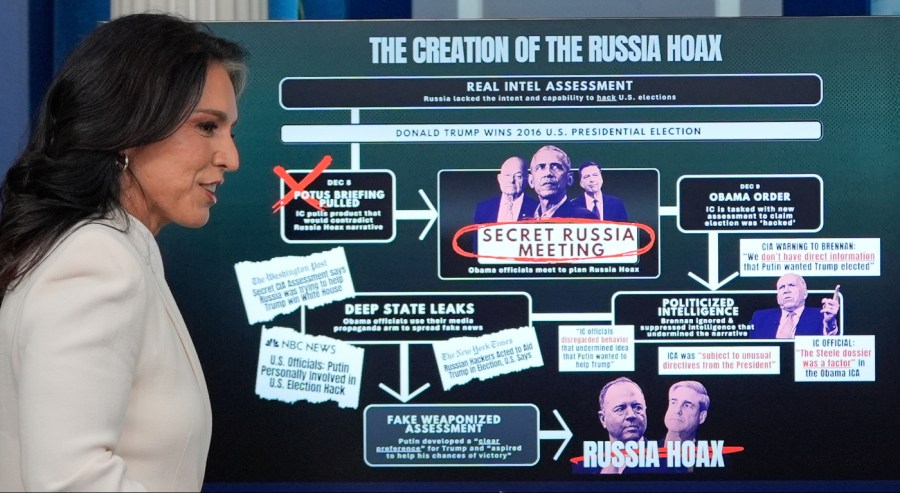Tulsi Gabbard is setting Trump’s base up for the next Epstein disappointment

Director of National Intelligence Tulsi Gabbard is sowing the seeds for MAGAs next Jeffrey Epstein moment and perpetuating a dangerous retaliatory cycle. She has accused former senior government officials of directing a treasonous conspiracy to undermine President Trump’s 2016 campaign.
Nothing Gabbard has released proves that assertion, including the 2017 House Intelligence Committee report questioning the intelligence community assessment that Russia wanted Trump to win the 2016 election.
That 2017 conclusion is at odds with the unanimous and bipartisan findings of the Senate Select Committee on Intelligence that found Russia did in fact try to influence the campaign in Trump’s favor but those efforts did not affect the outcome.
Gabbard’s claims reinforce a long-standing narrative prevalent among MAGA supporters that Democrats sought to destroy Trump’s candidacy, and then undermine his presidency, by manipulating information about Russian interference in the 2016 election.
Gabbard’s unsubstantiated conclusions will come back to bite the Trump administration the same way Attorney General Pam Bondi’s inability to release the Epstein client list has upset the president’s supporters.
Unless the Trump administration is prepared to fabricate evidence, it’s unlikely enough new information will ever be discovered to prove a conspiracy of the magnitude suggested by Gabbard.
MAGA supporters will be waiting for the mass arrest and imprisonment of Obama administration officials that never comes. Gabbard, and ultimately Trump, will be left to weakly explain why the conspirators aren’t coming to justice.
Gabbard’s powerful assertions came at a delicate moment for a Trump administration already caught in the middle of a similar storm of their own making about Epstein.
From the start, the investigations and public communications about Russian interference in the 2016 election were mishandled. It’s important to acknowledge that fact upfront.
President Obama didn’t have to release the government’s conclusions about Russian interference a month before the 2016 election, conclusions that lent an air of legitimacy to accusations against Trump being discussed publicly by supporters of Hillary Clinton.
The FBI’s probe into alleged collusion between the Trump campaign and Russia was itself predicated on flimsy information. Even if Gabbard’s wild assertions aren’t true, and there’s no evidence so far to suggest they are, the judgement exercised by parts of the government during and after the 2016 campaign still left a lot to be desired.
The Trump campaign had been the primary victim of the government’s poor judgement, but former FBI Director James Comey evened the score a bit when he announced the opening of an FBI probe into Clinton’s use of an unclassified email server days before the 2016 election.
Democrats botched the messaging around Russia’s interference with the 2016 election, either accidentally or intentionally inflating its role and falsely insinuating the Trump campaign had been involved. But Gabbard is now recreating their mistakes with her reckless accusations.
Now that both sides have weaponized intelligence for political purposes, what matters is to restore trust in the intelligence community. Gabbard would say she’s doing that by leveling her accusations in the name of transparency, but her aggressive assertions go beyond where the facts are leading and perpetuate an overblown narrative of government conspiracy.
Already, Democrats aren’t inclined to believe what she’s saying, just as most Republicans never bought into the Steele dossier or the assertions about Trump’s collusion with Russia.
Beyond the trust gap with Democrats, Gabbard is setting the conditions for a major falling out with the MAGA faithful. After Epstein, this will be the second time that Trump administration officials allege a massive conspiracy but aren’t able to produce evidence to support their claims.
Trump’s core supporters believe these conspiracies are real because their leaders, officials like Bondi and Gabbard, keep telling them that proof exists. They’ll demand action over Gabbard’s accusations, the way they are with Epstein, then be left with no choice but to assume the Trump administration is complicit in the coverup when no action comes.
This is a distraction Trump doesn’t need. He would do well to direct Gabbard to tone down her assertions rather than egg her on.
Going forward, the intelligence community, elected officials, the Justice Department and the government in general should take a lesson from former President Gerald Ford. Ford understood that prosecuting President Richard Nixon would divide the country and create more problems than it solved. He made the hard decision to allow what was probably criminal conduct to go unpunished to allow the nation to heal.
Except in cases of the most egregious crimes supported by the strongest evidence, the U.S. government should take a break from seeking to prosecute former government officials.
Democrats spent years rooting for Trump to go to jail or actively trying to put Trump in jail for perceived crimes. Gabbard seems intent on doing the same in reverse.
This is a bad place for the country to be, with the intelligence community being used against former officials and sensitive information being declassified when it suits a political purpose. This type of behavior will have a chilling effect on everything the intelligence community does and further divide our country.
The Trump administration should be the grown-up in the room and break this dangerous cycle now.
Colin Pascal is a retired Army lieutenant colonel who spent most of his career in Military Intelligence. He’s a graduate student in the School of Public Affairs at American University in Washington, D.C.